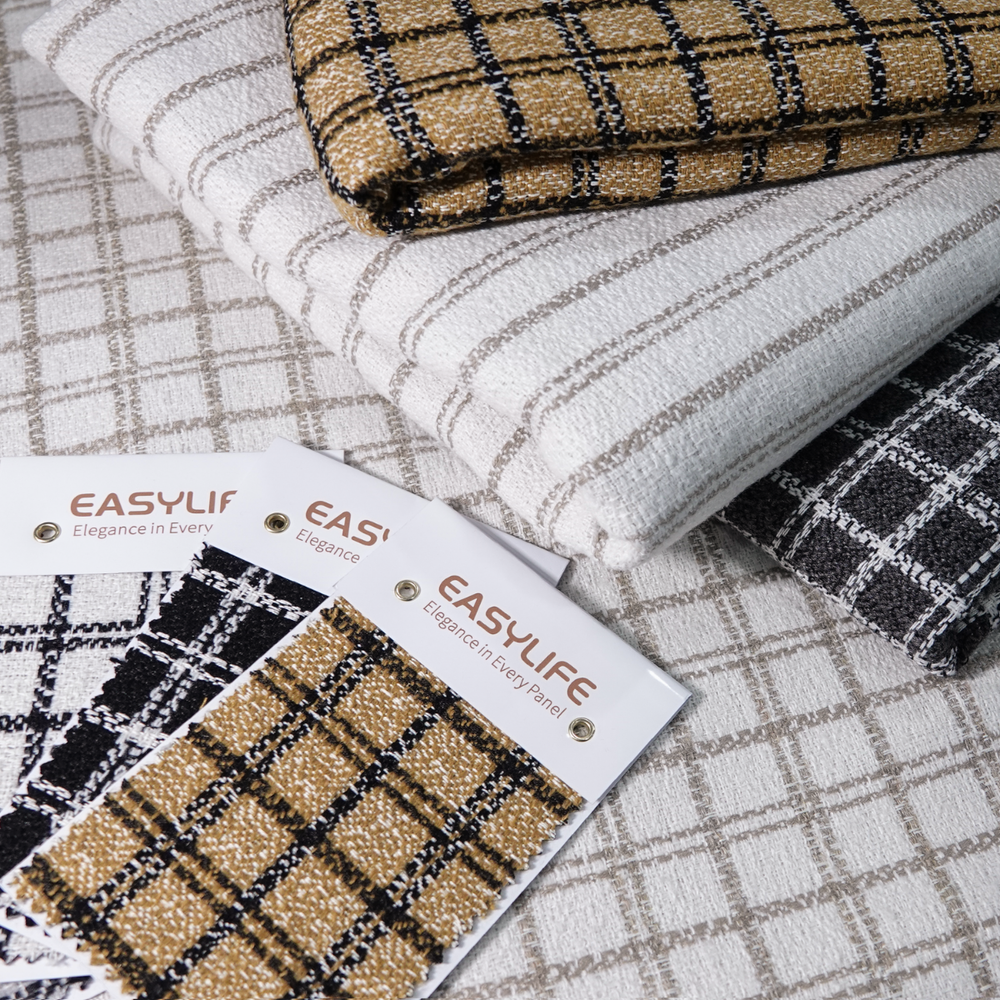Drapery Measuring Instruction
Simplify your curtain measuring process with our Measurement Finder first, designed to guide you through each step effortlessly for a hassle-free experience.
Step 1: Measure the Width
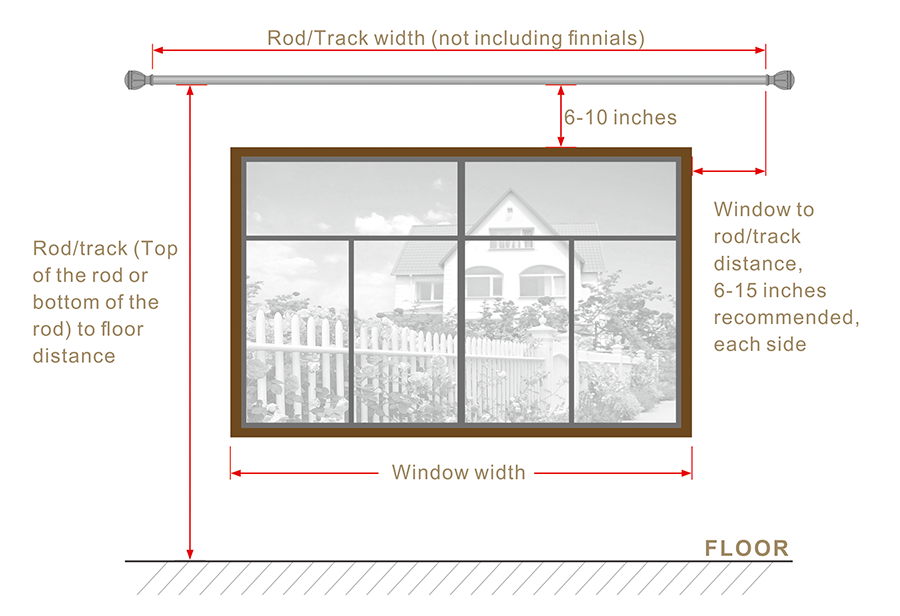
If you have had the rod installed, please measure the rod length and record this measurement.
Scenario 1: If the Curtain Rod is Already Installed
Simply measure the full length of the curtain rod and record this measurement. This will be the base for determining the curtain width.
Scenario 2: If the Curtain Rod is Not Yet Installed
Before installing the curtain rod, decide where you want it to be positioned above and on either side of the window frame. This decision impacts both the functionality and the visual appeal of your curtains.
· Height Above the Window Frame
For a taller and more elegant look, curtain rods are typically installed 6-10 inches above the window frame. Mark this height lightly with a pencil or use masking tape as a guide to ensure accuracy.
· Width Beyond the Window Frame
To allow the curtains to fully stack to the sides without obstructing the view, add extra width—typically 6-15 inches—on each side of the window frame. Lightly mark these points as a reference for the total width of the curtain rod.
Step 2: Understand Fabric Fullness【Pleated Header Styles】
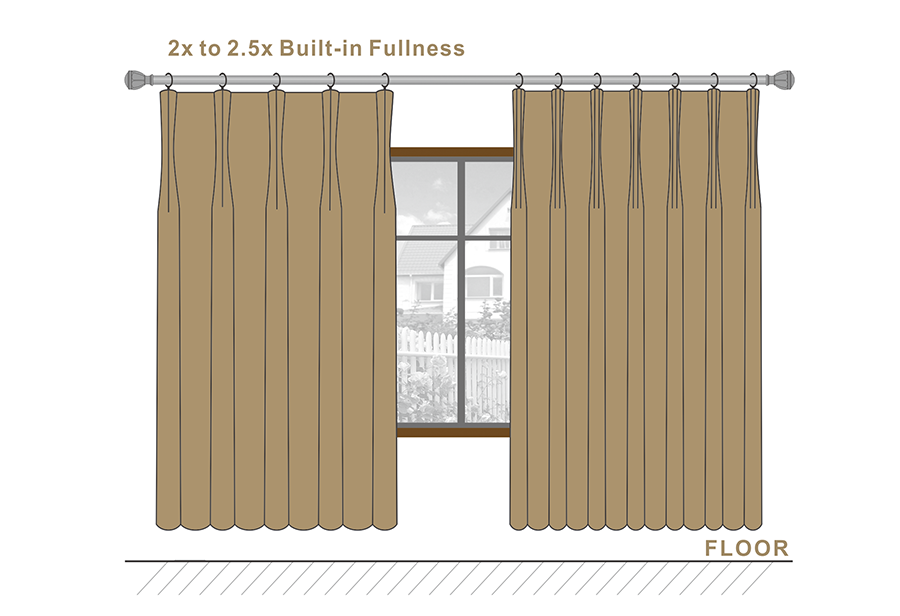
For pleated designs, the fabric fullness is already incorporated into the construction process. We use 200-250% fabric fullness to craft these styles, ensuring they have a rich, elegant appearance.
Here's how fullness varies by pleat type:
2x Fullness: Suitable for pinch pleats, tailored pleats, inverted pleats, and goblet styles.
2.5x Fullness: Ideal for triple pleats and triple tailored pleats.
It means you do not need to add extra width for fullness; it's already built into the processing of curtain.
【Soft Top and Grommet Header Styles】
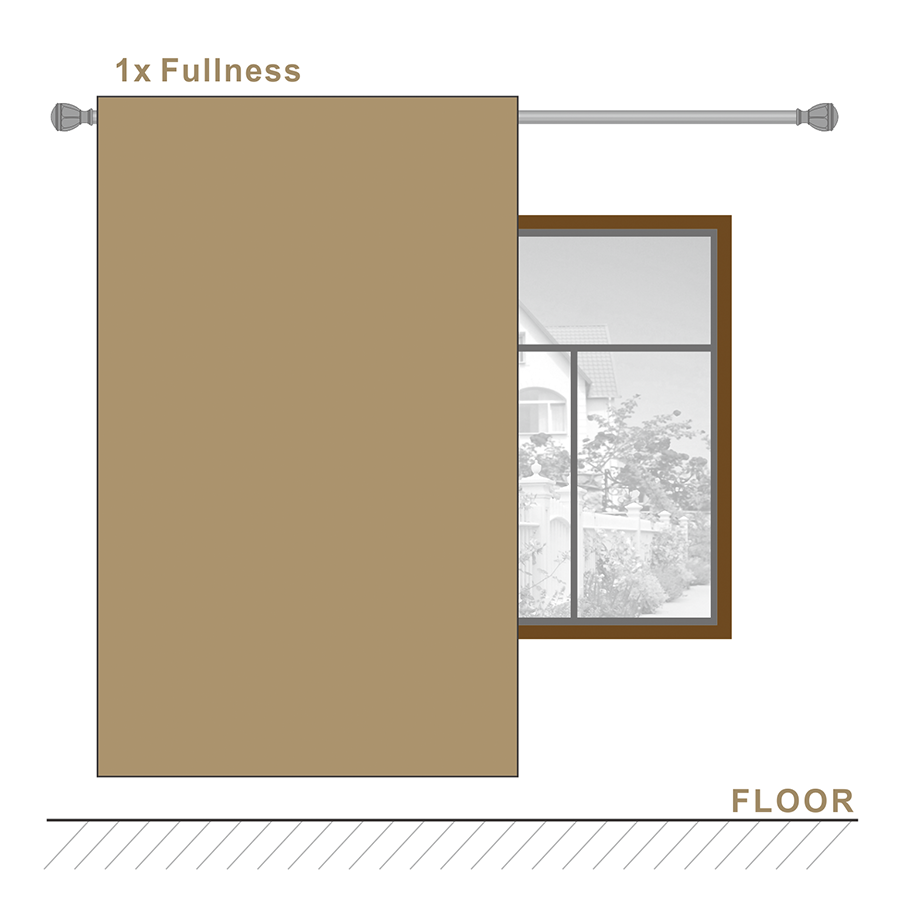
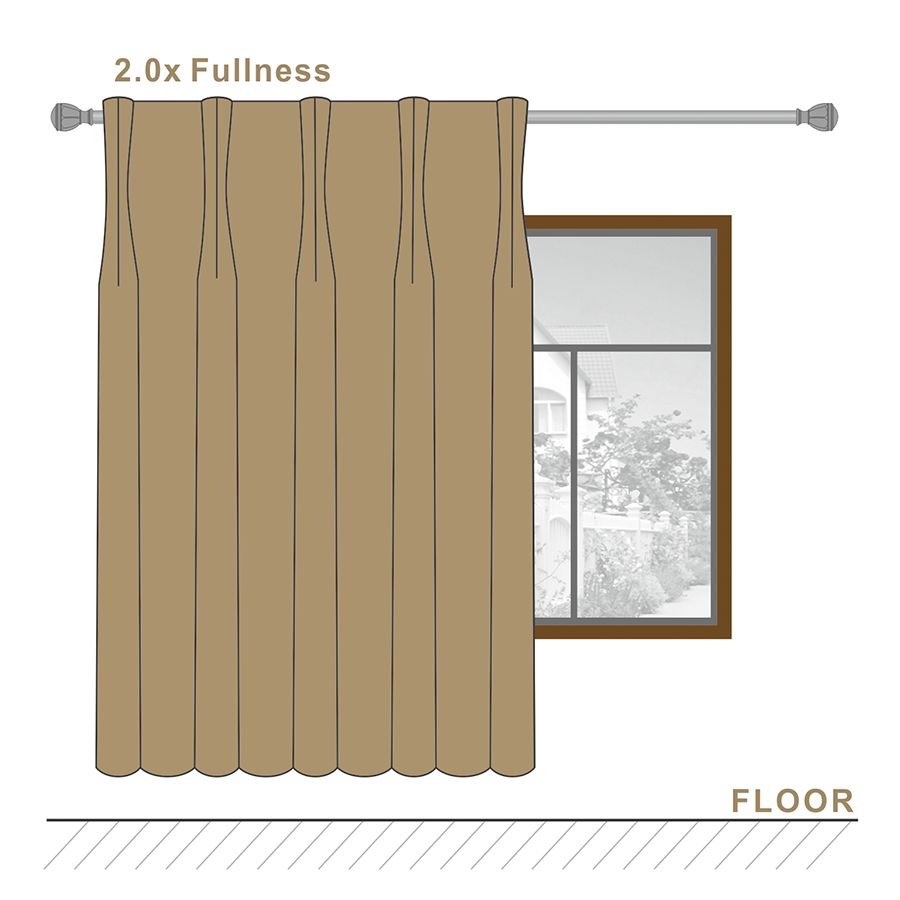
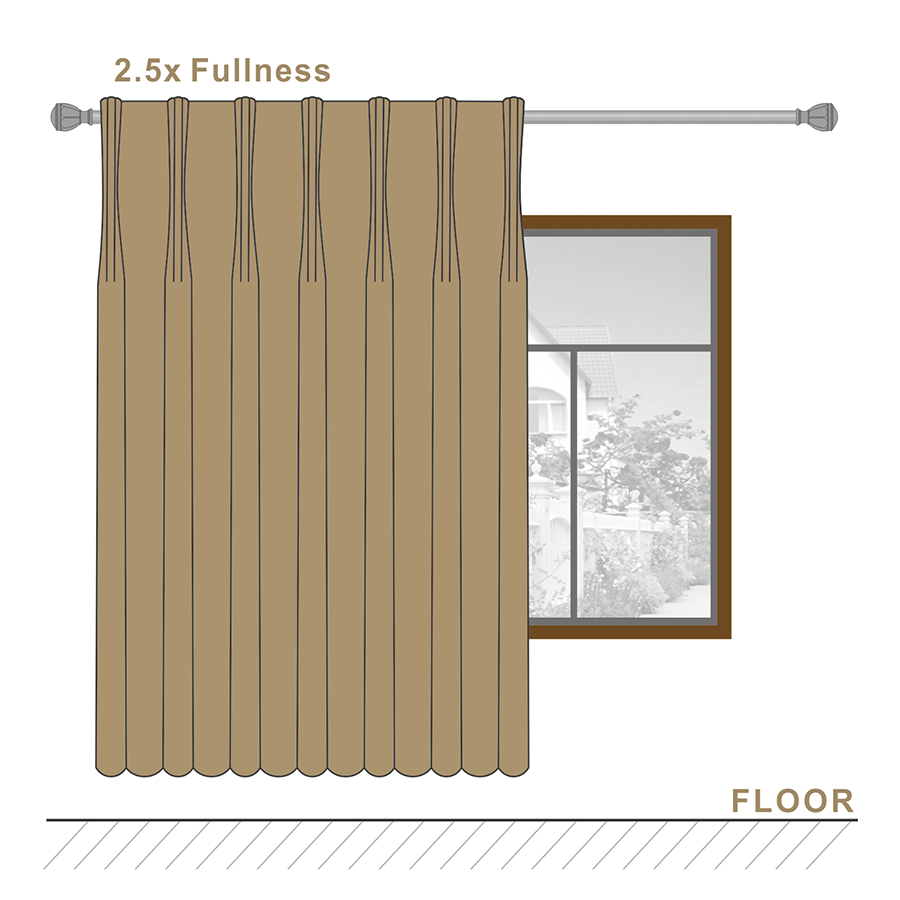
For soft top and grommet styles, the default fabric fullness is 1x (100%) of the rod width. However, to achieve a polished and aesthetically pleasing look, additional fullness is recommended.
Fullness Recommendations:
1.5x the rod width: Produces a more tailored, minimalistic gather.
2x the rod width: Creates a rich, luxurious, and opulent appearance, which is the most commonly recommended option.
Customizing Your Fullness Ratio:
The fullness ratio determines the depth and frequency of the folds, directly impacting the overall appearance.
· Select your desired fullness ratio based on the header style and your design preference.
· Calculate how many curtain panels are needed to achieve the selected fullness.
Keep in Mind:
Fullness requirements can vary depending on the header style. For instance, soft top and grommet styles typically need additional width to create their characteristic folds, while pleated styles (as noted earlier) have fullness built into their construction.
【Ripple Fold Style】
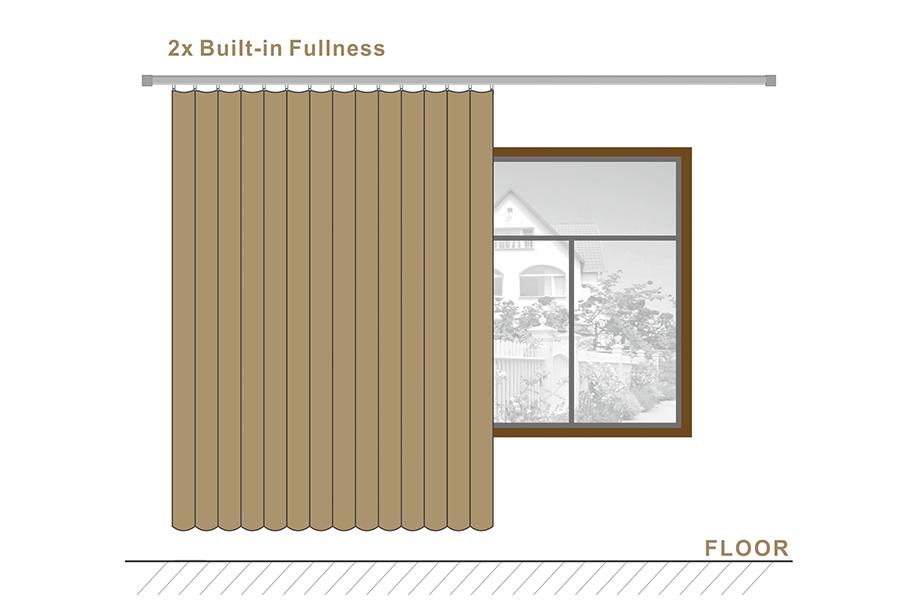
Ripple fold curtains are designed with a default fabric fullness of 2x (200%), meaning the fabric width used is twice the finished width you order. This ensures consistent, elegant wave folds without the need for adding extra fabric for fullness.
Types of Ripple Fold Curtains: We offer two distinct options for ripple fold header styles.
Belt Hook Type: Features a series of small hooks attached to a belt or strap sewn onto the curtain fabric.
Tape Buckle Type:Utilizes fabric tapes sewn into the top of the curtain panels.
With ripple fold curtains, the fullness is expertly incorporated during production, giving you effortless elegance with every panel.
Step 3: Determine Drapery Finished Width and Length (with example)
【Pleated】
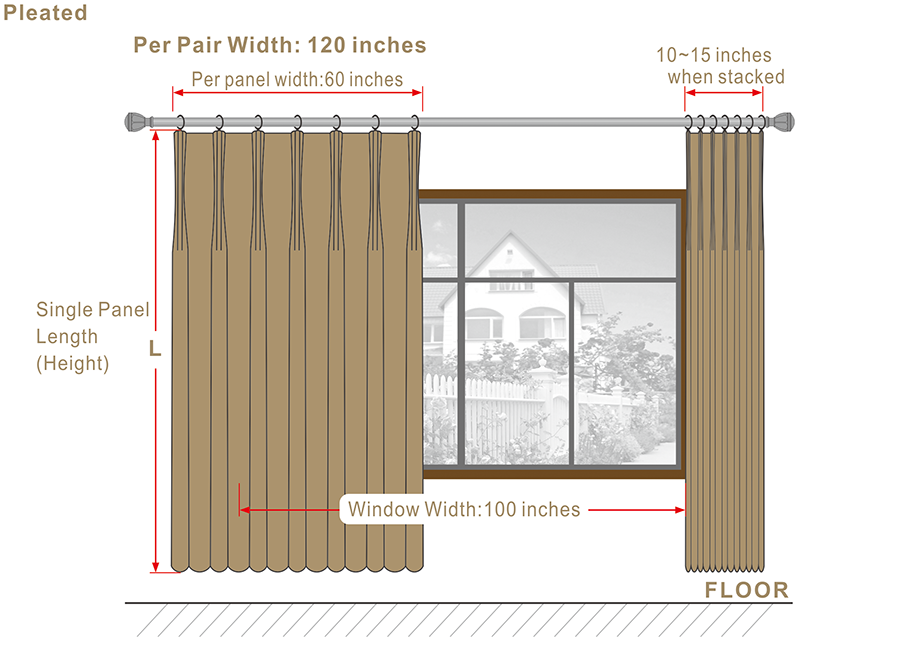
Single Panel Width (When Pleats Are Sewn)
How to Measure: Measure the width of the curtain fully extended from the left edge to the right edge, including the pleats. This will be the width you need to order.
Example: If your rod length is 100 inches, you may order two panels, each 50 inches wide, for a pinch pleat style.
Panel Width Explanation: The width of a curtain panel is measured from the outermost pleat on the left to the outermost pleat on the right, when the curtain is fully extended, not when it is stacked or gathered.
Curtain Length Measurement: Measure from the eyelet ring of the curtain hook to the bottom edge of the curtain for accurate length. This ensures the curtain hangs perfectly and achieves the desired look.
Fabric Fullness: To achieve the ideal pleated effect, we recommend a fabric fullness of 200%, meaning the actual fabric width is double the width of the ordered curtain.
Stacked Width: The stacked width, or the width of the curtain when fully drawn back, accounts for about 20% of the panel width you order, giving you a better view when the curtain is open.
Pleat Style: All pleats are permanently sewn for a neat, tailored appearance that ensures durability and a consistent look over time.
【Soft Top】
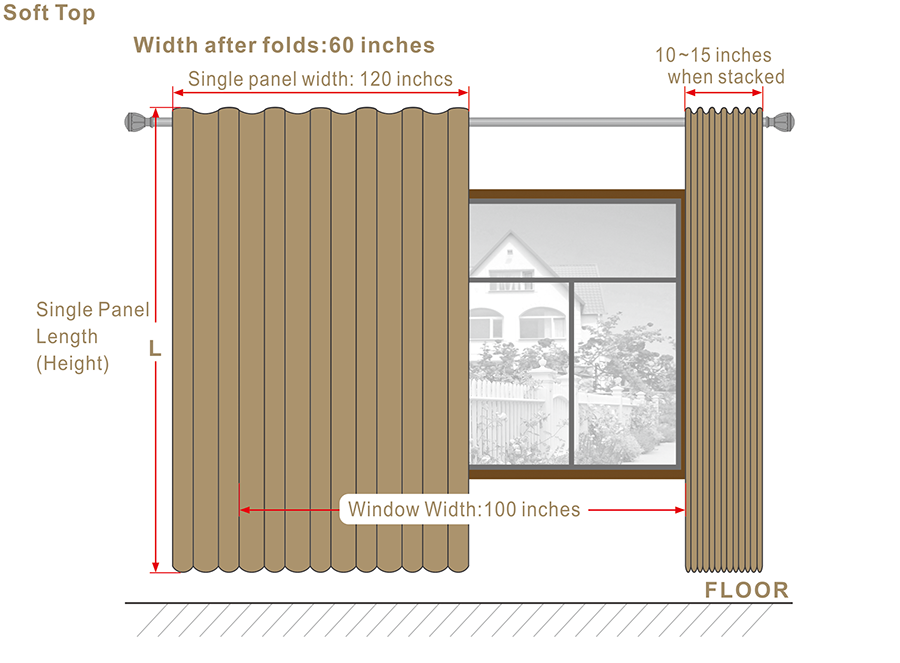
Single Panel Width (When Fully Extended)
How to Measure: The width of the curtain when fully extended should match the width you want to order.
Example: If your rod length is 100 inches, and you are ordering curtains with 200% fullness, you should order two panels, each 100 inches wide, for a Back Tab style.
Curtain Length Measurement: Measure the length from the top of the curtain to the bottom edge to ensure the curtain hangs properly and reaches the desired length. Compatible Rod Size for Back.
Tab Style: A curtain rod with a diameter of up to 1.6 inches works well with the Back Tab header style for easy and smooth installation.
Fabric Fullness: For a rich, full look, we recommend a fabric fullness of 200%, which means the fabric width is double the ordered panel width.
Stacked Width When the curtains are drawn back, the stacked width will account for about 20% of the panel width, leaving you with a tidy, compact stack.
【Groommet】
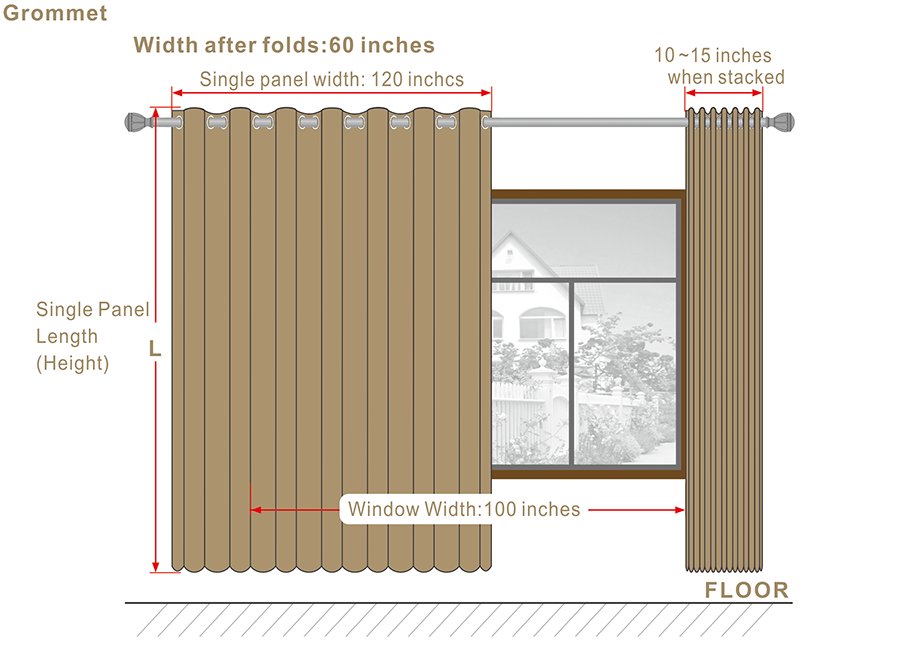
Single Panel Width (When Fully Extended)
How to Measure: The width of the curtain when fully extended should match the width you plan to order.
Example: If your rod length is 100 inches and you choose a grommet header style with 2x fullness, the total width required will be 100 inches × 200% = 200 inches. Therefore, you will need to order two panels, each 100 inches wide.
Curtain Length Measurement: Measure the length from the top of the rod down to the floor or to your desired endpoint. This ensures the curtain will hang at the right height.
Grommet Header Compatibility: The grommets have an inner diameter of 1.6 inches, which fits most standard curtain rods. Ensure your rod diameter is compatible for smooth movement of the curtain.
Fabric Fullness: To achieve a luxurious, full appearance, we recommend 200% fullness, meaning the total fabric width will be double the width of the ordered curtain panels.
Stacked Width: When the curtains are drawn back, the stacked width will account for approximately 20% of the panel width, allowing for a neat and tidy appearance when the curtains are not in use.
【Ripple Fold】
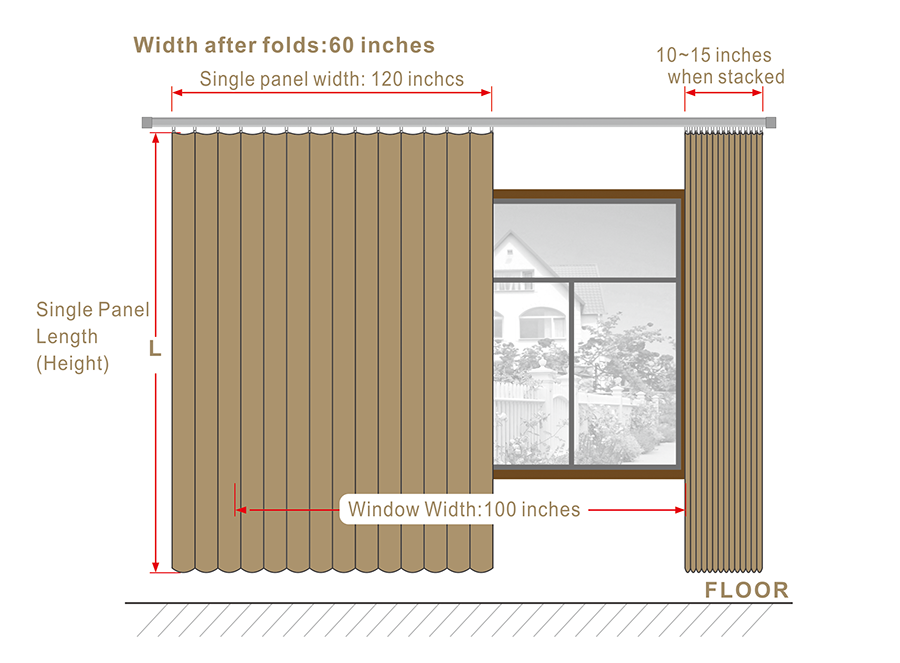
For Track Installed: Measure from the carriers or hooks on the installed track down to your desired curtain length. This will give you the exact length you need for a Ripple Fold style.
For Track Uninstalled: Measure from the point where the curtain track will be installed (whether on the ceiling or wall) down to the floor or your preferred endpoint.
Then, account for the Track Height (which includes both the track and roller hook height) and your preferred Curtain-to-Floor Distance (the gap between the curtain's bottom edge and the floor). Subtract these two values from the overall height to calculate the correct curtain length.
Example: If you plan to install the track 96 inches from the floor, the track height is 2 inches, and you want a 1-inch gap between the curtain and the floor, the calculation will be: Ripple Fold Curtain Length = 96 - 2 - 1 = 93 inches
Adjust Curtain-to-Floor Distance: You can adjust the Curtain-to-Floor Distance based on your style preference to achieve a neat and tailored look.
Lora Track Height The default Lora Track Height is 2 inches. This measurement is important for your length calculations.
Finished Width
Finished Width in Inches = Your Ordered Width. The width you specify will be the finished width of the curtain once the ripple folds are created. The finished width is measured after the ripple folds are formed, not when the fabric is fully stretched.
Panel or Pair Selection
Curtains are available in either single panels or pairs.
Example:
If your track length is 120 inches:
Single Panel: If you select panel, specifying the width as 120 inches, you will receive one panel with a finished width of 120 inches.
Pair: If you select pair, you will receive two panels, each with a width of 60 inches.
Fabric Fullness
For Ripple Fold curtains, we recommend 200% fullness, meaning the fabric width will be double the ordered panel width, ensuring the elegant ripple effect.
Stacked Width
When the curtains are stacked, the width will reduce by about 6-15 inches, depending on the fabric type and fullness.
Curtain Length Measurement
Measure from the hook on the track down to the bottom of the curtain to determine the correct length.

Determine Width
For Pleated Style, Single Panel Width = Rod Track Full Length / Panel Quantity
For Soft Top Style, Single Panel Width = (Rod Track Full Length x 200% fullness) / Panel Quantity
For Grommet Style, Single Panel Width = (Rod Track Full Length x 200% fullness) / Panel Quantity
For Ripple Fold Style, Single Panel Width = Rod Track Full Length / Panel Quantity

Find Your Perfect Placement
Different curtain lengths can transform the atmosphere of your room, offering a variety of visual effects to suit your style and needs.
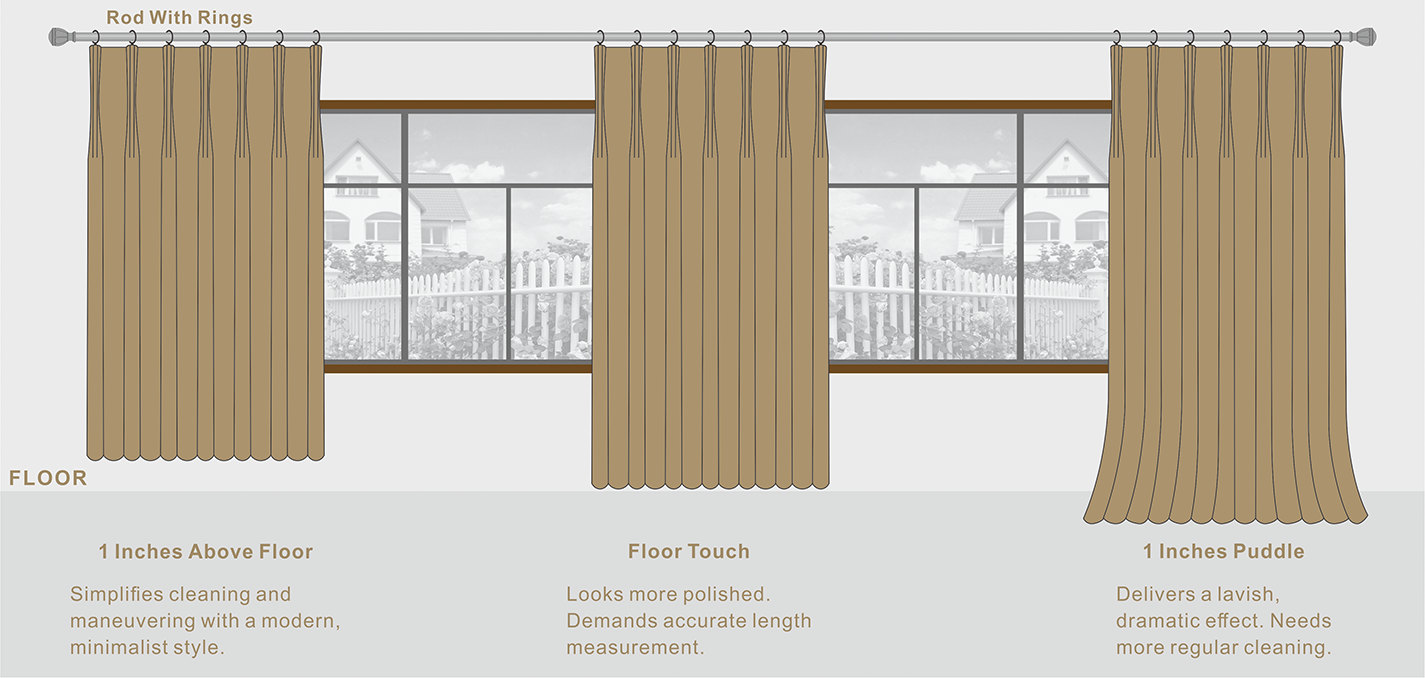
Note
Your custom drapery will be crafted precisely to the width and length you specify.
Header Options: Choose from Pinch Pleat, Pinch Pleat with Back Tab, Triple Pinch Pleat, Tailor Pleat, Triple Tailor Pleat, Flat Hooks, and more. Each header style includes adjustable pin hooks for easy installation. Please note that drapery rings or clip rings need to be purchased separately.
Accurate Measurement: Use a reliable steel tape measure for precise results, rounding to the nearest inch for both width and length.
Measure Individually: Each window or doorway should be measured individually, as dimensions may vary.
Fullness Preferences: The appearance of fullness depends on personal preference and style. Some may prefer a more relaxed, flowing look, while others might opt for a fuller, more gathered effect. Consider the overall aesthetic and functionality of your space when deciding on the fullness factor.
Additional Assistance: This guide provides general recommendations and may not address every possible scenario or measurement method. For complex setups or specific inquiries, feel free to reach out to us at support@easylifecurtains.com.


